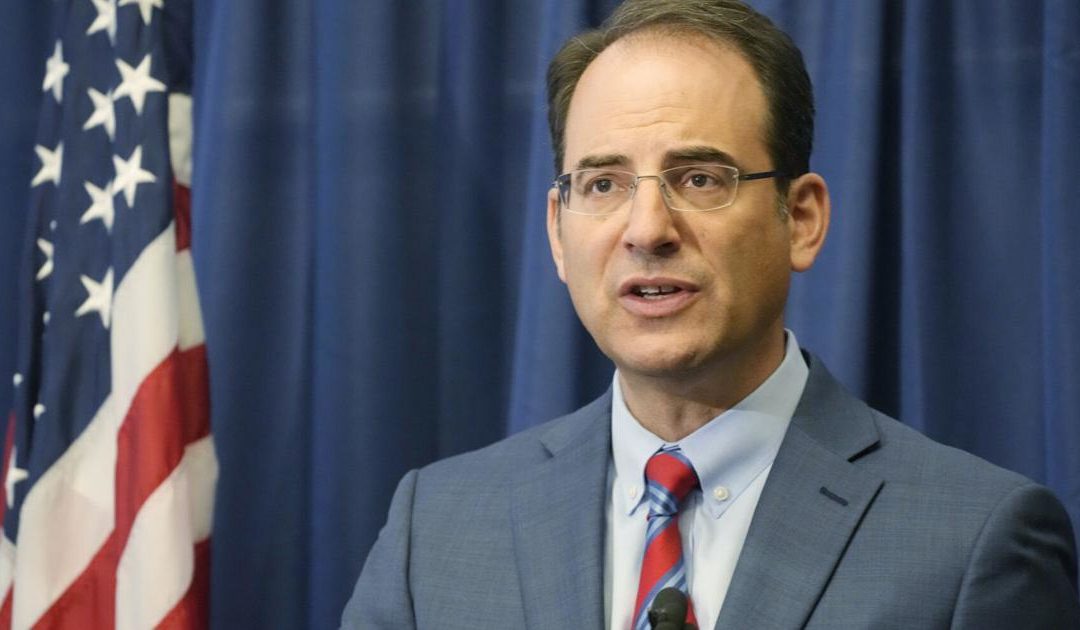Colorado Attorney General Phil Weiser does a lot for Colorado. He visits The Gazette’s editorial board several times each year, and we are pleased by the amount of common ground we find with a Democrat the board opposed in the 2018 election.
Weiser works diligently to help Colorado’s small businesses, which form the foundation of our diverse and resilient economy. As the former deputy assistant attorney general for the Justice Department’s Antitrust Division under then-President Barack Obama, Weiser understands the harm an unfair playing field does to consumers in everything from health care to social media platforms.
Weiser played a key role in securing a historic $26 billion multistate opioid settlement with Johnson & Johnson and the country’s three largest drug distributors. He’s using Colorado’s portion of the custodial funds to help local and regional governments combat the crisis in a manner that each jurisdiction deems most suitable.
Weiser spearheads a lawsuit against JUUL Labs, the despicable company that erased decades of progress toward reducing teen nicotine addiction for a few quick billions.
In addition to a litany of lawsuits to defend Coloradans — as the “People’s Lawyer” — Weiser heads up a movement of state attorneys general who met in Colorado Springs last summer to discuss toning down the country’s political strife. It’s called the Ginsburg/Scalia Initiative because former uber-conservative Supreme Court Justice Antonin Scalia and uber-liberal Justice Ruth Bader Ginsberg were best friends despite intense disagreements about politics and the law.
Weiser and board members happily employ the Ginsburg/Scalia Initiative. As such, Weiser has changed our minds on occasion. On one important issue, we hope our friend will reconsider his position and remove Colorado from an amicus brief signed by him and 23 other attorneys general. At issue is the highly controversial new abortion law in Texas, which restricts abortions after six weeks of gestation.
Weiser’s sponsorship of the brief, which he promotes on his website, supports the Biden administration’s petition asking the U.S. Supreme Court to overturn the six-week abortion ban in Texas. We asked Weiser last week what nexus this has to Colorado. He said Texans experiencing pregnancy come to Colorado for post-six-week abortions, making it our business. So what?
Sadly, abortion was a sacred right in Colorado — the first state to legalize it — before the 1973 opinion in Roe v. Wade. That ruling put severe restrictions on the authority of any state to regulate abortion. If Texas wins in the Supreme Court next year, the ruling would overturn Roe v. Wade.
Contrary to conventional ignorance, a pro-Texas ruling would not outlaw abortion. It would leave it to the states. Weiser agrees any such ruling would have no effect on Colorado, where the majority of the public has no will to restrict abortions.
Weiser tells us he challenged the Texas law, in part, because he wants equal rights among women and men. Despite silly claims to the contrary, women get pregnant and men do not. If a man never has to carry an unborn child, Weiser reasons, neither should a woman. Equal rights. This, of course, dismisses the rights of fathers who have no legal say when a mother pays a doctor to terminate a baby.
Weiser calls the Texas law unconstitutional. We asked, “How so?” Weiser cited the Equal Protection Clause of the 14th Amendment, which extends constitutional limitations on federal authority to the states.
There’s one big problem. The Constitution does not, by any stretch of the imagination, authorize the federal government to regulate abortion. The 10th Amendment leaves all matters the Constitution neglects to the people and the states in which they live. Any honest, nonpolitical interpretation of the Constitution leaves abortion regulations to the states. Without the ruling in Roe v. Wade, a handful of Bible Belt states would restrict abortion to varying degrees. Colorado and other center-left states would not. Think marijuana. Some states legalize, others do not. Former Justice Louis Brandeis, appointed by then-Democratic President Woodrow Wilson, called this system “the laboratory of states.”
With all due respect, Mr. Weiser should channel his mentor — the former Supreme Court Justice Byron White. A Colorado native who was runner-up for the Heisman Trophy at the University of Colorado at Boulder, White became the top graduate of Yale Law School — the highest-rated law school in the land. Weiser clerked for White, an appointee of Democratic President John F. Kennedy.
“I find nothing in the language or history of the Constitution to support the Court’s judgment,” White wrote in his Roe v. Wade dissent. “The Court simply fashions and announces a new constitutional right for pregnant mothers and, with scarcely any reason or authority for its action, invests that right with sufficient substance to override most existing state abortion statutes. The upshot is that the people and the legislatures of the 50 States are constitutionally disentitled to weigh the relative importance of the continued existence and development of the fetus, on the one hand, against a spectrum of possible impacts on the mother, on the other hand … “
White’s unassailable reasoning explains why the 14th Amendment does not apply in this conflict. It pertains only to limitations of authority addressed in the Constitution. It does not force states to comply with “laws” concocted by a court that has no lawmaking role.
We have real problems in Colorado. Our hospitals are near capacity. Rural hospitals are so poorly staffed people are dying needlessly of COVID and other survivable conditions. Our schools cannot decide whether to indoctrinate or teach. Our highways and bridges remain in disrepair.
We have important battles ahead and, thankfully, our indefatigable “People’s Lawyer” fights the good fight. The abortion law belongs to Texas, not Colorado. This is a case Weiser should forgo.
The Gazette Editorial Board
This content was originally published here.

